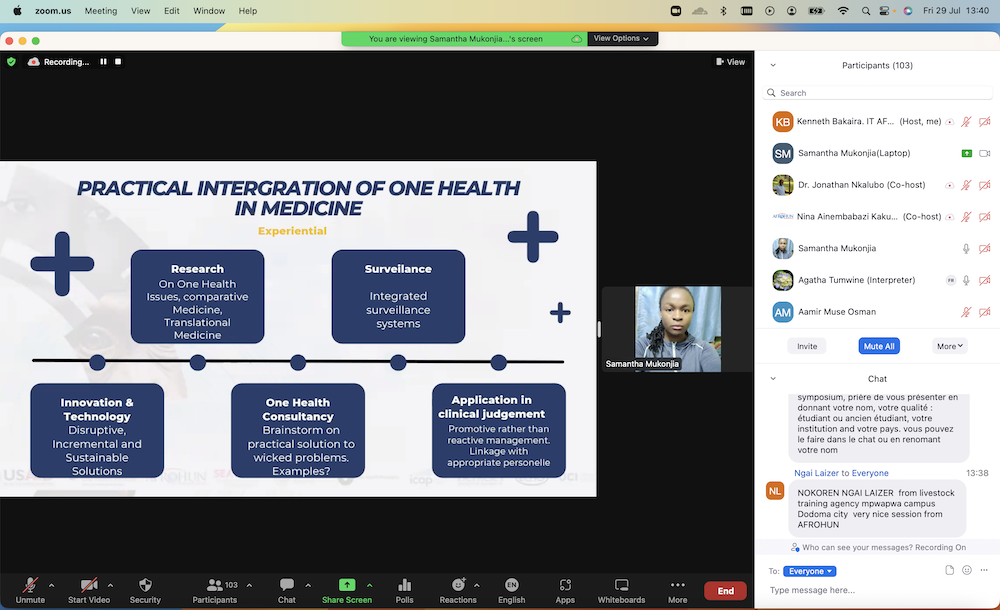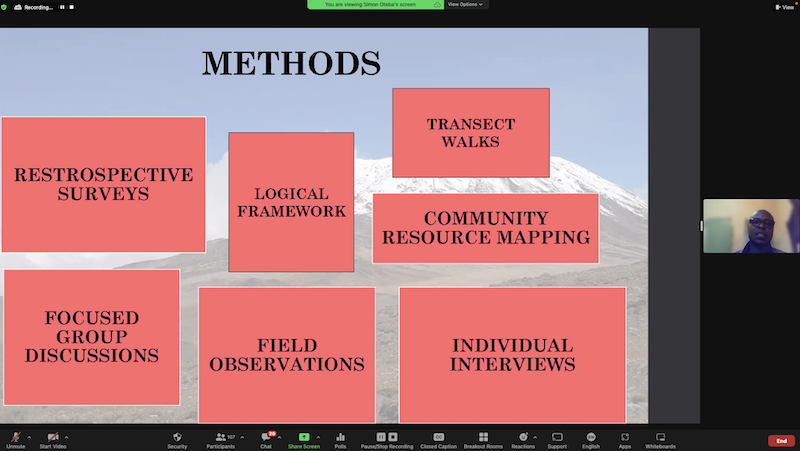Students are our major currency; the bulk of the work that we do, involves building One Health competencies among pre-service work force. AFROUN has in the recent past started an aggressive process of alumni tracking and engagement to improve the design and delivery of training programs. This work is done with USAID financial support under the One Health Workforce Next Generation project, implemented with technical support from a University of California Davis-led consortium of US universities and agencies.
Conducted virtually over two days for two and a half hours each, the symposium under the theme, “One Health Workforce Development: Voices and experiences of students and alumni”, the symposium attracted over 100 participants from across Africa.
Opening the symposium, the AFROHUN Chief Executive Officer, Professor William Bazeyo welcomed and encouraged the students and alumni who participate in the symposium, to keep sharing feedback with AFROHUN to enable the network design training programs that address emerging competence needs in the field. He noted that the network has contributed tremendously to the development of One Health capacity for the region, by training close to ten thousand pre-service and in-service professionals. He expressed the need for the different partners working in the region to come up with strategies on how they can come together to create synergies and work more efficiently.
Mr. David Wolking, the OHW-NG Technical Director noted that in One Health work, students and alumni are the ones often connected to communities, creating a bridge between communities and universities. It is therefore of utmost importance for universities and networks like AFROHUN to keep them engaged. He emphasized that most of the AFROHUN success stories are focused on student activities, especially experiential learning stories. He shared his own student experiences with One Health.
The keynote speaker for Day 1, Dr. Samantha Mukonjia gave a powerful delivery of how she has managed to integrate One Health into medicine which she considers ‘the unpredictable science’. She pointed out the importance of clinicians taking on a One Health approach as they engage their patients. “When I am with a patient, I look at them from the perspective of a member of a large community; living and interacting with many other people, animals and working within a certain environment. I know there are certain beliefs and practices that affect health outcomes too. This way, one is able to take the patient’s history in a wholesome manner”, she shared.

Dr. Mukonjia is formerly a Students One Health Innovations Club President at the University of Nairobi College of Health Sciences and is now based at the Kakamega County Hospital.
Ms. Mukonjia further noted that issues and conditions that seem simple and commonplace can meaningfully be handled using a One Health approach. She mentioned aging, snakebites, and nutrition, among others. They all need different sectors working together to address them. “Do not limit yourself to what is happening in your narrow scope of work, get to know what is happening elsewhere. There are many things and innovations happening worldwide”, she implored participants. She also pointed out the need to learn to conceptualize One Health to lower levels of community life.
As a student at the University of Nairobi, she participated in a number of training programs, including field-based experiential learning opportunities, like One Health Demonstration Site Field attachments and Global Health Case Competitions. These thrust her into the One Health limelight and catapulted her to international-level leadership. Responses to her keynote address indicated that her One Health training and exposure added value to her medical practice for better patient care.

Day 2 keynote speaker, Mr. Abdoulaye Samb shared his practical One Health experience as an environmental health student. Mr. Samb who was once President of the Senegal Students One Health Innovations Club (SOHIC) now works at the National One Health Platform and is undertaking his PhD studies. He shared that his One Health training built his engagement skills which has enabled him to engage key stakeholders at national and local levels. “At the National One Health Platform, it has been easy to transfer the knowledge to practice because there are many sectors represented and One Health is our core business. Working with people at community level is one of the best ways to translate One Health knowledge to practice”, he noted.
He noted that in One Health practice, intrasectoral and intersectoral issues are key to note, which the Senegal One Health Platform has been focusing on through sensitization of sector. “We dream that we will have a truly One Health approach once this sensitization is done right.
He noted that environmental issues are not yet at the forefront of One Health debates and narratives, yet current occurrences like famine, drought, extreme weather conditions, loss of forest cover affect food security, which is emerging as a real world crisis. Managing these effectively, he says, will require change in the way professionals are trained.
Presenting the SOHIC Roadmap, the Chair of the SOHIC Technical Working Group (TWG), Professor Salvius Bakari Amuri noted that the dream of the TWG is for Africa to become a model for One Health workforce development. He noted the need to innovate for One Health policy to ensure it truly impacts policy in a meaningful manner. He shared that one area the TWG is also focusing on is strategically cultivating data from students and alumni to be able to work better and smarter as AFROHUN continues to develop impactful training programs and support alumni better.
The 2-day symposium was closed by Dean Martin Ntawubizi of University of Rwanda. He noted that a good number of the presentations and posters were around prevention, community engagement, the SOHIC concept and this is used in learning and community empowerment. He further noted that One Health Demonstration Site field attachments are key in One Health work, in that they involve communities. Dr. Martin noted that the quality of the work presented, and level of the discussions was at international level.
He pointed out that the symposium was a good event and was in line with the AFROHUN TWG roadmap.
